Introduction to the Cape Cod Bay Flats
Cape Cod Bay has some of the most expansive sand flats in all the world. If you look on Google Earth, you can clearly see shallow water sand flats running from Barnstable Harbor east, all the way to Eastham, and then north to Wellfleet.
The flats of Cape Cod Bay are some of the most unique environments on the east coast of America. When surrounded by miles of sandbars at low tide, one can feel as if they have been transported to an entirely different planet.
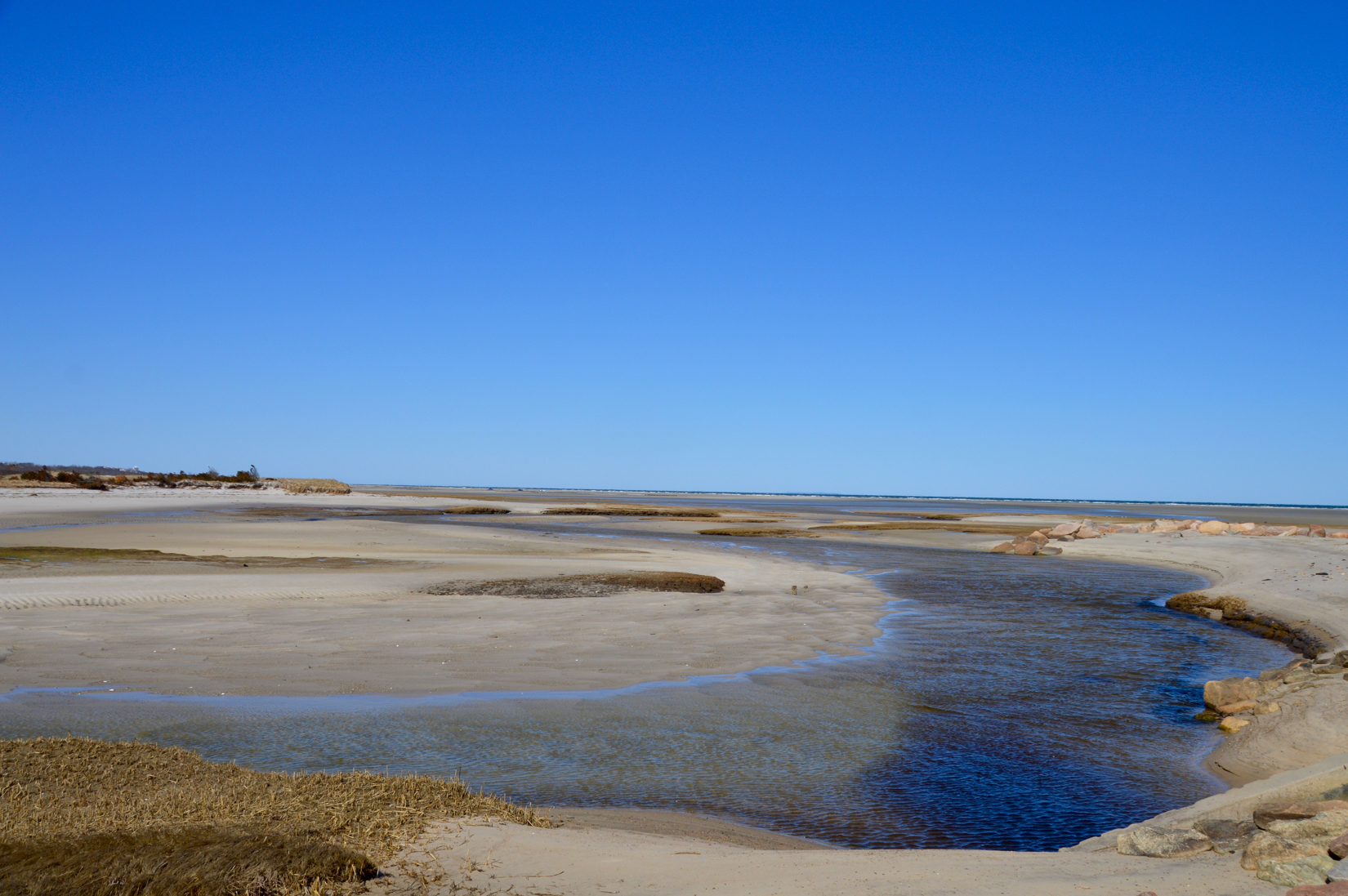
This creek is completely covered by water at high tide, but at low tide it's almost bone dry. You can learn more about this specific area by reading the full members-only post below.
On a sunny day, fishing the flats of Cape Cod is more like fishing the Florida Keys. Stripers cruise in foot deep water, much like Florida's famous bonefish. The water takes on a turquoise color that extends for miles in every direction. Under a summer sun tidal pools warm up to near 80 degrees as terns and sea birds dive for sand eels.
At times, the flats are almost a surreal environment. Whether you are fishing Monomoy, Brewster or Barnstable one thing is for sure - there is nothing quite like the feeling of being all on your own with miles of sandbar and stripers all to yourself.
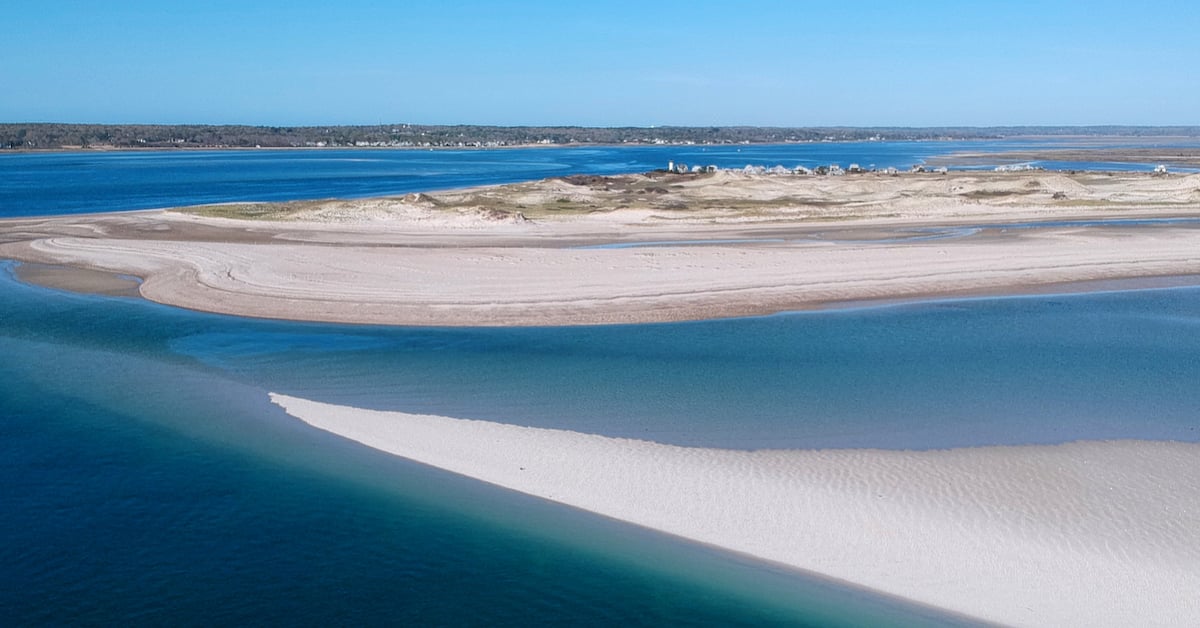
Mix in a few terns and gulls, the ocean lapping up against the sand, and a warm sun shining down from above and you have yourself one day to remember. Catching a few fish is really just a bonus.
June in particular is a terrific month to spend some time exploring and fishing the many miles of flats in Cape Cod Bay. The area can produce well no matter if you are fishing from a boat, kayak or on foot.
It’s also possible to do well over the flats using a variety of different approaches. If you like fly fishing then terrific, because you can most certainly catch fish over the flats on the fly.
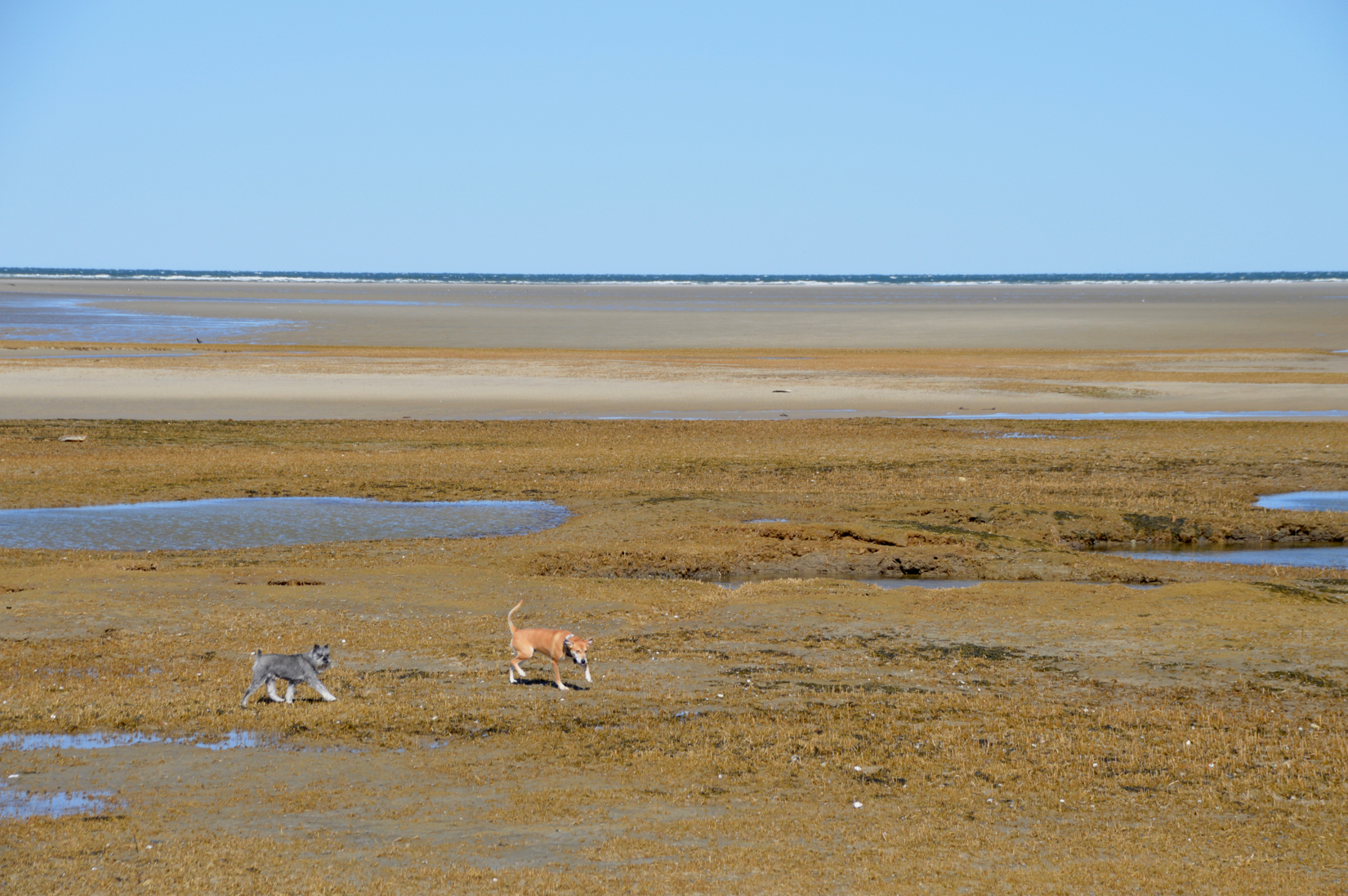
Spin anglers can do well tossing large lures that imitate herring and mackerel, or they can go ultra light with small soft plastics that mimic sand eels. Folks fishing from boats can live-line mackerel, sight cast, snap wire, or troll plugs and troll tube and worm.
In this post I’ll share with you some simple strategies, areas worth checking out, and other words of wisdom from my personal experience fishing the flats.
Specifically we’ll discuss the importance of tides, safety on the flats, techniques, general areas and other advice I feel will be useful for anyone thinking about fishing and exploring this super cool area of Cape Cod.
Bait on the Flats
Often the most abundant bait fish in the area is of course, the sand eel.
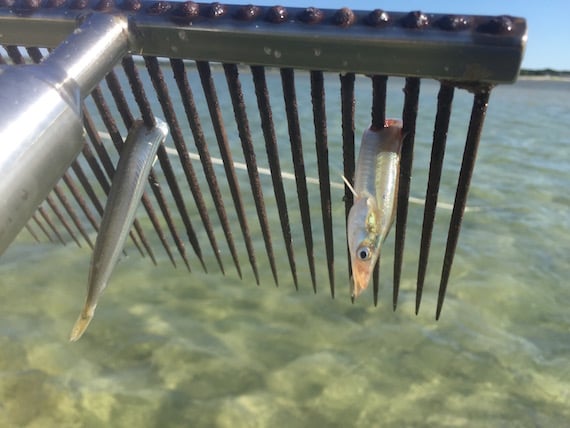
Most of these sand eels are on the small side, especially compared to the goliath foot long sand eels that you will find farther offshore. Nevertheless the sheer number of sand eels provides plenty of reason for striped bass to venture in shallow.
Aside from sand eels many of Cape Cod's flats hold other bait as well.
In the past I have found schools of juvenile bunker cruising over the shallows in the fall, and herring during the spring. The flats are also home to vast amounts of crabs, so for fly fishermen any sort of fly pattern can work really well.
Plugging The Flats

Bright sunny days are great for sight fishing over the flats, but typically I find the fish are easier to fool in rainy stormy weather.
When I was younger, I always associated flats fishing with small 7 foot rods paired with small spinning reels, light pound test line and small soft plastics. I had been led to believe that bass over the flats are incredibly spooky, and usually feed on small bait such as sand eels.
While in many Cape Cod flats fishing scenarios this is certainly true, myself and some members here on My Fishing Cape Cod have in recent years “discovered” that big popping plugs and swimmers, fished on 30 pound braided line with a typical surfcasting setup, can also work - especially during May and June when herring are present in tight to shore.
Fishing with big plugs over the flats is something worth getting excited about, however it does not seem to work very well on clear, calm and sunny days. Best success over the flats with big plugs seems to come on the rainy, overcast and generally miserable weather days.
The bass seem much more willing to attack big plugs under these conditions.

MFCC member David Griswold with a huge striper caught using a topwater popper on the Brewster Flats on July 14th, 2017.
I have seen on several occasions in the stretch from Sesuit Harbor east to Rock Harbor, large schools of striped bass coming up over the edge of the flats and into shallow water during the incoming tide. This is quite the sight to say the least!
I believe these schools charge the shallow water flats during the incoming tide because they know they have the tide on their side. The water is only going to get deeper, so the fish seem much more brave. I've also experienced this at Paine's Creek, which is the area shown in the photo at the top of this post.
Couple an incoming tide with some overcast, windy and generally miserable conditions and you have a recipe for good plugging. This is exactly what happened to me during Memorial Day Weekend of 2021. You can learn more by watching the video below.
Channels & Troughs
During the last part of the outgoing tide I will walk out onto the flats and focus on the deep channels and troughs, which can be easily located on Google Earth. Believe it or not, stripers will literally get stuck in some of these troughs and tidal pools, where they will be forced to wait out the tide.
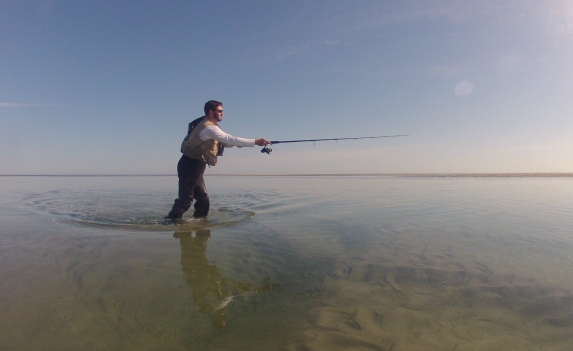
In other channels, the bass use the deep water as a highway. As the tide recedes all the life in the area is forced off the shallow water sandbars and into the deeper channels.
I believe most of the bass use the troughs as a highway out into Cape Cod Bay where they will often congregate during low tide just beyond the edge of the flats. Other fish hang behind, never leaving the flats, and instead roam the channels and cuts during the low portion of the tide.
Fishing these channels and troughs is really fun and unique. I have literally stood on bare sand more than a half mile from shore, catching fish left and right, in a spot which at high tide has 10 feet of water above it. Fishing a spot like this can be productive, but it is also risky.

Never-ever stay too long, and always retreat back to shore as soon as the incoming tide begins. No fish is worth risking your life. Alternatively you can use a small skiff or kayak to extend your fishing time out on these far off sandbars.
Boat Tactics
During high tide you can use your boat to cruise over the flats and sight cast to the schools. Live mackerel is one of the best baits for fooling these often finicky fish, and fortunately mackerel are often easy to come by in Cape Cod Bay during the month of June.
During 2017 I also had good success over the flats in my boat by “speed trolling” Sebile Magic Swimmers right along the surface. You can also tube and worm, or jig wire along the edge of the flats. This is where the shallow sandbars suddenly drop off into deeper water.

Follow the contour and keep an eye on your sonar. There is almost always at least a fish or two hanging along the edge, especially during June.
Tide & Safety on the Flats
The most important factor when fishing over the flats is the stage of the tide. In the past my best success fishing the shallow water has occurred during the first part of the incoming tide. I think the fish are well aware that they have the tide at their backs, which makes heading into shallow water safer for the fish. With an incoming tide, there is no chance of fish getting stranded on the sand or in a tidal pool.
Kayaks as well as skiffs work best when fishing over the flats. However I typically find myself in my 21 foot boat, anchoring up wherever is appropriate and then walking to where I want to fish. When doing this you really have to understand how the tide moves in the area you are fishing. It is very easy to make a mistake if you are not familiar with the area and either have your boat high and dry on the sand, or out of reach when the tide comes in.
Fishing the flats can be one of the most dangerous types of fishing a recreational fisher can do off Cape Cod. It is extremely important to not get careless when wading any area-especially a tidal flat. A mile of sandbar can be completely underwater within an hour in many areas.
Said another way, a completely exposed high and dry section of sand at low tide could be covered by 10-15 feet of water at high tide. Add in the fact that the sandbars undulate in depth, and that it is often possible to walk a mile or more straight out to see, and you have a potentially fatal fishing situation.
Having a strong understanding of the tide, wearing a life jacket, fishing with a buddy, having a hand held GPS AND a regular old compass is very important. Not taking any chances is a very good idea when wading over the flats. Be prepared to walk back to your boat, kayak or parking lot in dense fog - because there's a decent chance you will have to.
You must also resist the urge to push the limit, and stay on an offshore sandbar when the tide has turned and begun coming back in. This can be easier said than done, especially when the fishing is on fire, but you have to play it safe.
What happens often is guys will assume they have plenty of time left on the flats because they might be wading in say, waist deep water. However, this does not guarantee that the water closer to shore will be shallower!
In many spots the water is actually deeper the closer you get to shore. This is due to undulations in the sandbar which are difficult to detect. It is very possible that the water closer to shore is neck deep, even though the water you are wading in farther offshore is only waist deep.
Spots to Access the Flats
There are plenty of places from which anglers can access the flats of Cape Cod Bay. Some are easy to access with plenty of parking, while others are a bit more secretive with more challenging access.
Some of these spots I have personally been to and fished from, while others I am yet to personally visit.
Be sure to do a little research beforehand to check the latest parking regulations if you plan on fishing these areas during the height of the season. All of these spots will be far less busy and parking much easier before 8am and after 5pm, and before Memorial Day and after Labor Day.
If you're a member of My Fishing Cape Cod, you can view 3 of the more popular places to access the flats by viewing the maps below.
In Conclusion
When done in a safe manner, fishing over the flats can result in impressive striper catches in surprisingly skinny water.
Individual bass will often cruise over the flats but don't be surprised if you stumble upon a large school of stripers cruising in skinny water. Expect them to be fussy and difficult to fool when sun is high in the sky, but more ready to bite during inclement weather and at night.
Cape Cod Bay's tidal flats are a unique and beautiful place to catch striped bass. If you're into catching plenty of fish on light tackle in skinny water, these flats may just be your slice of fishing paradise.
Tight lines!
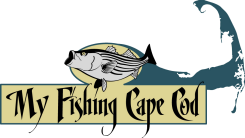


Great stuff Ryan. I live in Central NY. Have all seasons wading gear for my area. Trout streams/rivers and Lake Ontario shoreline. Fly & Spin fishing. Please provide details on what to wear especially for possible nasty weather. What were you wearing when on the rocks in above video “Memorial Day Weekend of 2021”, especially the soles on your boots? When I make it out there again, best to be prepared!
Awesome Joe! I have never been to your area but it sounds pretty nice!
For nasty weather, I wear a STORMR surf top, with Simms lightweight waders, and Simms Tributary wading boots. A Rockhopper surf belt tight around my waist is also important for safety.
Many fond memories of learning Brewster flats and Paines creek area. I caught my first Cape Cod stripers there.I have walked, waded,kayaked, and boated the area. It’s like stepping back in time, unchanged for many years…
Good point Steve. While they are always shifting, I am sure those sandbars in general have looked similar for the last thousand years, if not longer! Thank you for your comment.
I love anchoring the boat , or beaching it at low tide in a tidal pool. Then explore the sandbars and nature. Tide comes in and I motor out.
Ryan
I am enjoying your newsletters.
We are coming over from the UK in June 2022.
From your comments it would seem wise to use a guide for fly fishing the flats.
Do you have any recommendations please.
Regards
David
I’m glad you’re enjoying the newsletters David! The 2022 season will be here before we know it.
For guiding on the flats, you could try contacting Ian McPartland, Ian Bragdon, or Erik W. from the Goose Hummock Shop in Orleans.
Here are links to their Instagram accounts, which you can contact them through:
https://www.instagram.com/ianbragdon2/
https://www.instagram.com/fish_with_wiz/
https://www.instagram.com/ianmcpartland/
Hey Ryan,
Enjoyed your article. Planning on visiting in late September. Would that be a good time to fish the flats?
Honestly John, I’ve only ever fished the flats from late May through early July.
However I know there are members inside our forum who fish there throughout the entire season and catch fish. Here’s a link to a thread devoted specifically to the flats. You can follow that thread for weekly and sometimes daily updates. It’s a fishy area regardless of the time of year.
Ryan, Heading up your way in a week with my son for some fishing. The flats look interesting at the least. Please let me know what would be a good option for us to diversify some other than the canal.
Thanks,
PR
Hey Patrick ??
Are you a member of My Fishing Cape Cod?
I just searched our member database but couldn’t locate an account for you.
If you’d like, please sign up and then send me a message via [email protected] and I will do my best to point you in the right direction. ✌?
Good piece Ryan- Have you ever tried fishing the flats with the fly rod? Are sand eels the predominant bait?
Also where are the access points for getting to the flats you are referring to in the blog?
Thanks,
Brian
Hey Brian – for access points please fire me a direct message in the forum and I will send you some links ??
I have not yet fished the flats with the fly rod but I definitely will soon. Believe it or not the predominant bait this week were mackerel and squid. However there are always crabs, and during the summer, sand eels.
Yes Ryan, great piece especially the cautions about carrying a compass. A couple of years ago one of the guys at goose hummock made that point emphatically. I did some scouting in the off season and got stoked. The flats are literally just down the street from my home in Eastham on the bay side. I’ve fished south sunken meadow half a dozen times last year usually targeting the last 2 hrs of the incoming tide till the first 2 hrs of the outgoing tide without much luck except for feeding the no see ums even when there no breeze ( even with deet liberally applied). Perhaps the hike out at low tide may be productive. I’ve been hitting the small parking lots at beaches in Brewster, but noticed that it’s by permit after 6/15. Do they check and ticket after 6pm ? Eastham does not check after 5-6 pm. If so I too would appreciate alternative parking spots. I’m heading out to Skaket tonight. Thanks, Rich
Hey Ryan – i sent you a direct message, hoping it went through as it was my first time using that feature
Yep I got the direct message and just replied yesterday.
Rich you can also send me a direct message in the forum if you’d like and I’ll share with you some access points. ??
Great piece Ryan. I could see how one could get caught up in the moment and forget how far from shore they are. Though I’ve never fished there it sounds like an incredible spot.
It is a gorgeous spot. If you are nervous about walking out at low tide, then just go at high tide. The flats can be even more productive 2 hours before to 2 hours after the high. Tight lines Mark!